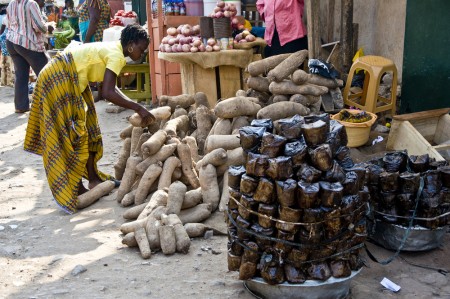February 13, 2016 – The barriers set up by well meaning but misguided activists opposed to GMO (genetically modified organisms) will cost Developing World nations up to $1.5 trillion U.S. in lost economic benefits through 2050. Much of this GMO opposition comes from Europe where obstacles to adoption and development of DNA-manipulated crop species is pervasive.
So why is opposition in Europe (19 countries) so harmful to Developing World nations? Because policies coming from European Union countries exert a disproportionate influence on countries that trade with the continent. The disparity is quite notable comparing the experience of the Americas and that of Eurasia. In 2014-15 DNA-improved crops were grown by 16.5 million small farm holdings in 20 developing countries, almost all situated in the Americas. Farmers earned significantly more and spent far less on pesticides, in fact 50% less. The net benefit amounted to $32.9 billion. But in Africa only 3 of 54 countries authorized the growth of DNA-modified crops.
Why did most African countries follow Europe’s lead? Because European activists disproportionately influenced African government leaders to apply similar GMO bans. This was further reinforced when European countries banned imports of produce from countries growing GMO crops. To add insult to injury, European development assistance to Africa under the Cartagena Protocol specified anti-GMO policies. The impact in sub-Saharan Africa in particular has been described as acute. Africa, which relies on a disproportionately large export market in Europe, 6 times greater than exports made to North America, found itself unable to sell produce in Europe without kowtowing to European restrictions. At the same time because of the lack of GMO plantings, African agricultural productivity lagged other parts of the world in terms of surplus yields.
The Genetic Literacy Project, a not-for-profit advocacy group aimed at increasing general knowledge in the use of DNA-based technologies to improve crops and livestock estimates the following:
- Africa in 2013 produced $1.01 billion worth of cotton. If GMO cotton had been grown replacing 70% of the existing plantings, harvest value would have increased by $156 million.
- Africa in 2013 produced $482 million worth of soybeans. If GMO soybeans replaced 79% of the existing plantings, harvest value would have increased by $84 million.
- Africa in 2013 produced $10.6 billion worth of corn (maize). If GMO corn replaced 32% of the existing plantings, harvest value would have increased by $744 million.
The foregone income of nearly $1 billion in 2013 is considered a conservative number. For the average African farm it would mean income increases of 25% (from $3,000 to $4,000 per farm household). It also has punished Africa in another way. Without the improved yields, many sub-Saharan African countries find themselves having to import food staples to feed their citizens, a further drain on national income. Projected into the future that foregone $1 billion is estimated to balloon to a total of $1.5 trillion by 2050.
The Information Technology and Innovation Foundation (ITIF), a not-for-profit, non-partisan research and educational institute, in an independent report describes the benefits of GMO seeds to agriculture globally calculating that this biotechnology has added $133 billion in farm income over the past two decades and delivered an average increase in farm income of 62%. At the same time the adoption of GMO sees has led to a reduction in pesticide use of over 500 million kilograms (1.1 billion pounds), a decrease of 37%. Crop yields have grown by 22%.
In its conclusions ITIF describes GMO-crops as having a “strongly positive track record” and further states, “In view of the unprecedented demands to increase agricultural production and productivity over the next 30 years, it is critical that such restrictive regimes be rolled back everywhere as rapidly as possible.” It is time that the science of GMO overcome the nonsense that continues to perpetuate the “frankenfood” myth.











